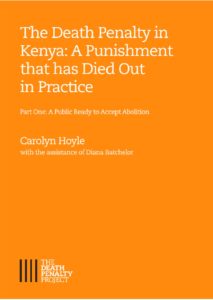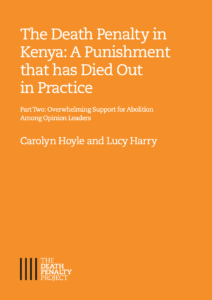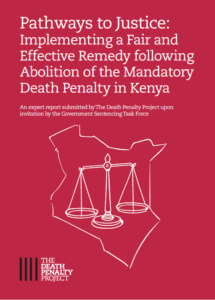The Death Penalty in Kenya: A Punishment that has Died Out in Practice, Part One - A Public Ready to Accept Abolition
- Reports and Studies
- 14 Jun 2022
In 2021, The Death Penalty Project and the Kenya National Commission on Human Rights, in partnership with the Australian National University commissioned Prof. Carolyn Hoyle, Director of The Death Penalty Research Unit, at the University of Oxford, to undertake research in order to provide accurate data on attitudes towards the death penalty in Kenya and facilitate a constructive conversation on the future of capital punishment. The research examined the views of both the general public in Kenya and also opinion formers, those considered influential in shaping, and responding to, national views.
Part One: A Public Ready to Accept Abolition – A survey of a representative random sample of 1,672 members of the Kenyan public.
Key findings:
- 40% in favour of abolishing the death penalty, 10% did not know either way
- 51% in favour of retaining the death penalty, only 32% strongly in favour
- Those against the death penalty believed that criminals deserved the opportunity for rehabilitation.
- Knowledge of the death penalty appears to be limited, just 66% were aware Kenya retains the death penalty and just 21% knew no executions had take place in the past 10 years
- The public expressed concerns around the possibility that innocent people could be sentenced to death: 61% of the public – including retentionists – thought that ‘many’ or ‘some’ innocent people have been sentenced to death in Kenya; only 8% thought that ‘no innocent people have been sentenced to death’
- Public support fell from 51% to 31% when considering abolition in the region
- 59% of the public, who were initially in favour of retention, said that they would accept a new policy of abolition
Read Part Two: Part Two: Overwhelming Support for Abolition Among Opinion Leaders, here.




